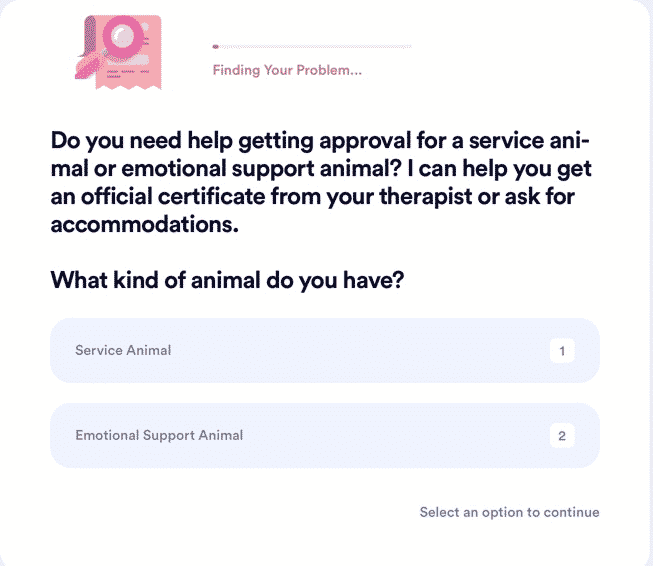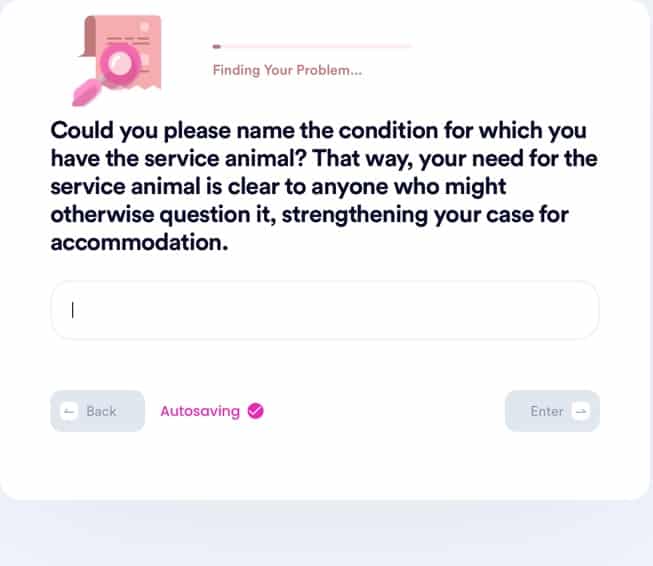What To Do When Your Therapist Won’t Write You An ESA Letter
If you have an emotional support animal that helps you cope with day-to-day life, you will need a letter from a mental health professional in order to take your support animal everywhere you go.
You’ll use that ESA letter to bring your animal into an apartment that doesn’t allow pets, or to keep it with you in a hospital setting. With the right paperwork, you might be able to keep your ESA with you on a plane.
But what if a for you? Is there anything can you do to convince a therapist that your need for a support animal is real? Yes, DoNotPay can help.
What is an Emotional Support Animal?
Creatures that provide comfort and assistance to persons with one or more psychological disabilities may be classified as emotional support animals. Such animals are not specifically trained to do the same sort of tasks as, say, Seeing Eye guide dogs or Sensory Signal dogs, but they are nonetheless quite important to persons who find it hard to cope with typical situations that others might handle easily.
What Constitutes a Psychological Disability?
To qualify for a registered emotional support dog, a person must meet certain requirements. According to the California Association of Marriage and Family Therapists (CAMFT) there are three broad categories of qualifying conditions:
- Mental or psychological impairment that substantially limits major life activities
- A record of the mental or psychological impairment
- Being regarded as having such a mental or physical impairment
What is Included in an ESA Letter?
To be valid, your ESA letter must meet the following criteria.
| Criteria for ESA letters |
|
Can My Therapist Give Me an ESA Letter?
Only licensed therapists and medical professionals may write an ESA letter on behalf of anyone. Interns and trainees may not write ESA letters. Those who can include:
- Licensed clinical social worker
- Licensed marriage and family therapist
- Licensed professional clinical counselor
- Licensed psychologist
- Primary care physician
- Psychiatrist
Why Some Therapists Won't Write ESA Letters
A therapist who is not familiar with the person asking for an ESA letter may decline to write a letter. A therapist who feels that animal therapy is beyond their scope of expertise may also decline to write an emotional support animal letter.
The National Association of Social Workers advises therapists to exercise caution when approached to write an ESA letter and recommends such letters only be written for a current client.
If a therapist does write an ESA letter for a patient and that patient's request for reasonable accommodation such as boarding a plane or moving a support animal into a no-pets apartment is denied, the therapist may be forced to share psychotherapy records or even be called to testify in a court of law.
How to Ask For an ESA Letter On Your Own
If you believe you have a legitimate need to be accompanied by an emotional support animal to help you cope with major life activities, talk with a doctor or mental health therapist from whom you are receiving treatment. Ask them to write a letter on their official letterhead and include your name, the name and breed of the animal, along with the reason you need an emotional support animal. With an ESA letter in hand, you may be allowed to enter a restaurant, get on a plane, patronize a business, and rent an apartment where animals are generally prohibited.
A Better Way to Get Your ESA Letter
Convincing a therapist, especially one with whom you do not have an established relationship, to compose an ESA letter can be a tedious process with no guarantee that it will work. Fortunately, DoNotPay can make the process a lot easier. Here's all there is to it:
- Search "service animal" on DoNotPay.

- Select the type of issue you need help with, including contacting your landlord about your ESA/service animal, asking your airline about ESA options, or requesting ESA/service accommodations at other venues.

- Answer a series of questions about your current situation and the details of your ESA/service animal, so we can generate the best results for you.

We'll take it from there. Once you give us the green light, the world’s first lawyer will contact your landlord to explain your need for reasonable accommodation, or we can reach out to the airline of your choice to obtain the information you need. If you ask us to contact your therapist or health professional and request an ESA letter on your behalf, we will.
But that’s not all you can do with the app.
- DoNotPay can help you register a support animal.
- DoNotPay can help you take your ESA support dog on an airplane.
- We can persuade your landlord to accept your ESA companion animal.
- DoNotPay can explain the Fair Housing Act as it pertains to support and service animals.
- Use the app to board a United Airlines flight with your support animal.
- And finally, DoNotPay can help you understand the rules about support and service animals
If your , contact DoNotPay right away!


